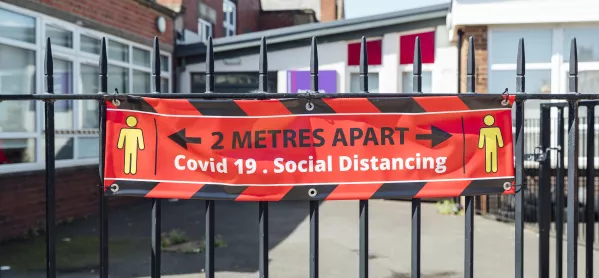Exclusive: Schools left to pay £42m Covid costs by DfE

Schools have been left to cover at least £42 million of extra costs associated with the Covid-19 pandemic after requests for financial help were rejected by the government, Tes can reveal.
This is despite headteachers warning that many schools could be sent over the edge financially after spending thousands of pounds on keeping sites as Covid-safe as possible.
Related: School Covid costs could ‘wipe out’ catch-up funding
Read: Covid costs are pushing schools over edge, warn heads
School funding: Thousands demand funding for school Covid costs
The Department for Education set up a scheme for schools to apply for support with “exceptional” Covid costs, such as additional cleaning and keeping schools open over the holidays for vulnerable pupils.
Through this scheme, which set strict limits on the type and amount of expenses covered, schools asked the DfE to reimburse more than £144 million of Covid costs covering the 2019-20 summer term.
But, while £102 million has been paid out to schools, a further £42 million of claims were rejected, the DfE has confirmed to Tes.
There were also a “small number of payments” due where schools claimed above their claims limit. A DfE spokesperson said: “We are actively engaging with those schools, who should receive payments shortly.”
Coronavirus: The financial impact on schools
Julia Harnden, funding specialist at the Association of School and College Leaders, said: “This is yet more evidence of the inadequacy of the government’s response to the financial impact on schools of the Covid crisis and we are extremely disappointed to hear that it has rejected £42 million of claims.”
Heads have previously criticised the scheme for being too limited; for example, only covering additional cleaning costs due to confirmed or suspected coronavirus cases at school - not the costs of preventative cleaning.
And schools were automatically ineligible if they planned to add to their financial surpluses during the year or were able to draw on reserves.
However, the DfE had originally said that schools could submit claims for “other extraordinary costs” outside of the narrow categories set out by the scheme.
But any such claims were rejected, a DfE spokesperson confirmed, saying they accounted for all £42m of the unmet amount.
‘A poor way to treat schools’
Ms Harnden said that in the ASCL’s experience many of these rejected claims were for things that were “entirely reasonable in the circumstances”, including “resources and equipment to make school buildings Covid-safe, such as signage and protective screens”.
The DfE’s decision not to cover any of these additional claims was “a poor way to treat schools after everything they have done to support pupils throughout this crisis, and the significant additional costs they have had to shoulder in the process”, she added.
Second funding round
The DfE opened a second round of the Covid costs scheme in December, but said this time it would not even consider claims for other extraordinary costs.
Details on the number of successful claims through the second round have not yet been disclosed.
A separate funding scheme has also been set up by the DfE for schools hit by extra staffing costs relating to the pandemic, for schools that have used a set amount of their cash reserves and hit a government threshold for the number of teachers who are off work.
A DfE spokesperson said: “We have paid schools £102 million for all claims made as part of the exceptional cost fund first claims window. We will process claims made in the second window shortly.
“As well as the exceptional cost fund, we launched the Covid workforce fund to support schools facing significant budget pressures and staff absences, which comes on top of schools’ existing core funding which is seeing the biggest boost in a decade. We are also investing a further £300 million into early years, schools and colleges for tutoring, building on the existing £1 billion Covid Catch-up Fund.”
You need a Tes subscription to read this article
Subscribe now to read this article and get other subscriber-only content:
- Unlimited access to all Tes magazine content
- Exclusive subscriber-only stories
- Award-winning email newsletters
Already a subscriber? Log in
You need a subscription to read this article
Subscribe now to read this article and get other subscriber-only content, including:
- Unlimited access to all Tes magazine content
- Exclusive subscriber-only stories
- Award-winning email newsletters